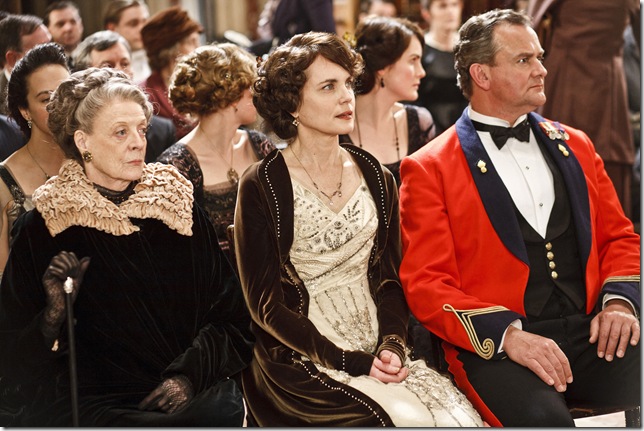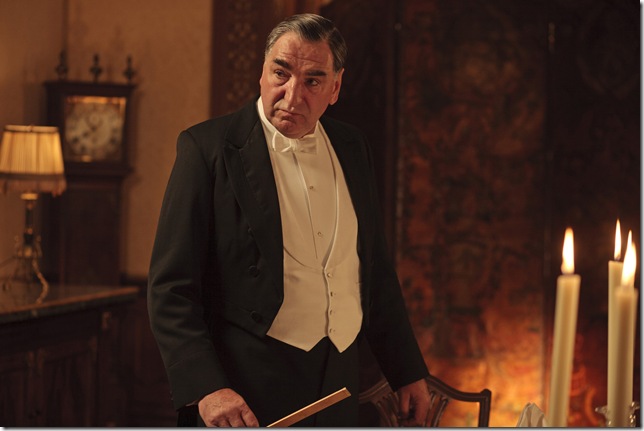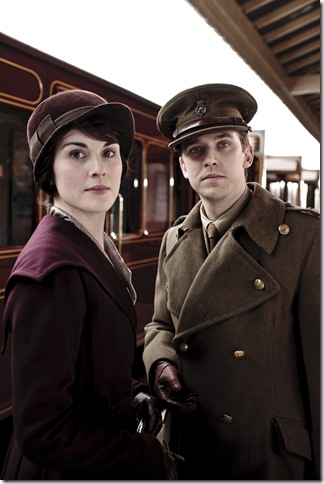By Tom Tracy
Last year, a parody film short appeared on YouTube offering a send-up of the hit TV period drama Downton Abbey, with mock scenes of the show, faux-interviews with the cast and writers, and a scene recalling the ironing of morning newspapers.
The latter was a reference to a brief scene in the opening episode of Season One of Downton Abbey (apparently newspapers were ironed in fancy British households as a way of keeping the ink from bleeding onto the hands of posh people upstairs). It was just one of the carefully curated period details found in the world of Downton and which has set it apart as something special among viewers.
A recent piece of writing from the BBC declared Downton Abbey a bona fide cult TV viewing sensation in the United States and elsewhere. On the Sunday of the 2012 Super Bowl, it came in a respectable second most-watched program that night, at more than 4 million views.
Currently in its second season and with a third now in production, the show represents the biggest hit for PBS’ Masterpiece (formerly Masterpiece Theatre) in a decade or more. It has spawned intense viewer loyalty and fan interest, generating bloggers, writers and historians to weigh in on what’s actually going on.
Written and created by Oscar-winning writer Julian Fellowes for Carnival Films, Downton stars Maggie Smith as Violet, Dowager Countess of Grantham; Hugh Bonneville as Robert, Earl of Grantham; and Elizabeth McGovern as Robert’s wife, Cora, Countess of Grantham. Set in an Edwardian country house in the 1910s, during the reign of King George V, the series portrays the lives of the Crawley family and the servants who work for them.
What exactly are people connecting to that they show up at parties or the office and ask: “Did you see ‘Downton Abbey’ last night?” Some Brits are speculating that we are fascinated by the great wealth and sprawling country estate of the fictional Lord Grantham and his wife and three daughters. Or they worry the British class system at the turn of the century offers an appealing curiosity.
Historian Simon Schama has criticized the show’s popularity in the United States, and accused it of “cultural necrophilia” and of offering “clichés” about British stately homes. He writes in an essay in Newsweek that the series appeals to Tea Partyers needing to satisfy a nostalgia for a time that never actually existed:
“ ‘Downton’ serves up a steaming, silvered tureen of snobbery. It’s a servile soap opera that an American public desperate for something, anything, to take its mind off the perplexities of the present seems only too happy to down in great, grateful gulps.”
Mr. Schama, author of A History of Britain and a professor at Columbia University, may be reading a bit too much into this. We realize there is probably a good bit of historical liberty taken by Downton Abbey’s creators, and we are not dreaming of the good old days in a serious way.
First of all, the series is beautifully filmed at a splendid location (Highclere Castle, which you can rent for weddings and events as well) and on state-of-the-art digital cameras. The cinematography brings to life the period costumes, the fashionable hats and hairdos, the antique cars, the dining room scenes and lush exteriors.
Beyond that, Downton’s casting and direction are razor-sharp, and every character is well-defined and natural. Dialogue is spot-on and emotionally delivered.
What viewers might be responding to is not snobbery but beauty and formality — the formality of manners, language, customs and social standards of another time and place. Add just enough humor and a soothing soundtrack with a catchy theme and you have the makings of a hit series.
Like a good soap opera, watching the series invites one to wonder: which of these characters am I most like, or which resonates most with my situation? Many of us do in fact work for someone else, so we know broadly speaking what it means to be “in service,” to be downstairs.
We also know real people of privilege who do in fact have parking valets, domestic help, and various people in tow to help run their lives. We have all met these characters before — the meddling co-worker, the nosy siblings, the overbearing grandmother-patriarch.
Some say it’s Dame Maggie Smith who pulls the train along but I find it’s the dapper Hugh Bonneville’s Lord Grantham serving as the essential anchor. In Season Two we get plenty of temper and indignation from Grantham, expertly dished up by Bonneville, who is longing to be of some use at the onset of World War I.
I recently went back watched the first season of the series Upstairs, Downstairs courtesy of YouTube, and there is no doubt that much of the story devices and plot lines were right there, 40 years ago on PBS. We have a rigid head cook barking at kitchen maids, unplanned pregnancies, staff hiring and firings, extramarital sexual liaisons, and a whiff of scandal that threatens the family’s standing.
As critics have rightly noted, probably those influences crept into the Downton series not by accident. Downton can also be faulted for lacking depth in the dialogue and too reliant on visuals and emotions. Season Two is far too busy with too many subplots. Nonetheless we enjoy the ride.
So the U.K. wonders if the world is longing for British snobbery. I don’t think that is the case any more than it was true that The Sopranos had us wishing we grew up around the New Jersey mob. It’s just exceptionally good television.


